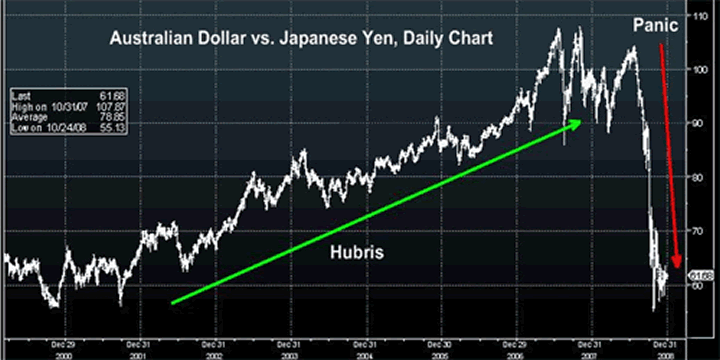Carry Trade Over, But the Yen Still Goes Lower
Currencies / Yen Carry Trade Apr 05, 2009 - 07:39 AM GMT

 Bryan Rich writes: For the past eight years, the carry trade — where investors borrow money from a country with low interest rates and invest it in places that provide higher returns — became extremely popular. And since Japan kept interest rates below one percent, the yen became the funding currency of choice for carry trade investors.
Bryan Rich writes: For the past eight years, the carry trade — where investors borrow money from a country with low interest rates and invest it in places that provide higher returns — became extremely popular. And since Japan kept interest rates below one percent, the yen became the funding currency of choice for carry trade investors.
But the carry trade wasn't just a government bond parking lot for traders looking to take advantage of nice healthy yield differentials. The intensity escalated as asset returns were soaring and credit was abundant. Investor appetite for risk was insatiable. And banks were fighting each other over how to extend financing for such risk.
 |
| For the past eight years, investors borrowed money in currencies like the Japanese yen for almost nothing. |
So investors borrowed money in currencies like the Japanese yen for virtually free! Then they took that currency and exchanged it (sold it) for foreign currency denominated assets, such as U.S. stocks … global real estate … energy infrastructure projects … OR just plain short term interest-bearing securities with attractive yields. The returns were, in some cases, single digits, double digits, and much, much more.
The big risk for investors: Owning a foreign-currency-denominated asset for its high yield then losing asset value because the currency declines.
Under normal circumstances, carefully managing the risk of a currency's decline versus the reward of the interest rate differential would require extreme diligence. But with the underlying value of high-yielding currencies soaring, self-fulfilled by the constant flow of carry trade seeking investors, the returns on these trades skyrocketed!
But that wasn't good enough …
Capital was pouring into hedge funds and competition for that capital was fierce — return was king. And with every incentive in the world to gather as much money as possible and knock returns out of the park, managers dialed up the leverage on these one-way bets.
It Works … Until It Doesn't Work
The payoffs were huge! But the risks were larger — and systemic. The risk profile of these trades turned into a Ponzi scheme-like gamble. Riding the wave and getting out in time meant a handsome payoff. And staying in too long meant certain disaster.
The carry trade and other notable investment strategies were exposed to “unexpected events.” For example, when the housing bubble burst and the credit markets froze, demand for risky assets evaporated and the carry trade collapsed.
The Australian dollar represented a high-yielding, high-risk currency. The Japanese yen represented a low-yielding, funding currency. This pair — AUD/JPY — gave up eight years of gains … in three short months!

Source: Bloomberg
After a strong surge in the yen as a result of the painful unwinding of the carry trade and the global deleveraging that has taken place, the yen is now staging another decline. Does that mean the yen carry trade is back?
Not so fast …
ZIRP + Global Instability= Death of the Carry Trade
Most advanced economies have moved aggressively toward the zero interest rate policy (ZIRP). Japan, the pioneer of ZIRP, is among them.
 |
| Japan's auto export shipments to the United States are down a staggering 66 percent. |
And those countries that haven't moved rates dramatically lower yet are likely to be forced into higher rates, to compensate investors for the elevating risks associated with their economies. OR they are trying to fend off currency speculators from attacking their currencies. Neither situation makes for an attractive place to put your money.
While yield was the driver of currencies over the past eight years, the focus now is on safety. Safety is measured by global leadership, political stability, economic fundamentals and the prospects for sustainable economic recovery.
And this is precisely why the yen is being sold now and why it has further weakness ahead.
Japan's economy has been hit hard by the global crisis. Its export-based economic model is being stressed by the evaporation of worldwide demand. Its all — important, auto export shipments to the United States are down a staggering 66 percent.
To make matters worse, the yen is outperforming its neighboring Asian trading competitors' currencies because of the dramatic unwinding of the carry trade, making Japan's goods more expensive.
You can see how the yen has strengthened against the dollar while other Asian currencies have fallen in this table:
| Asian Currencies vs U.S. dollar | 1-yr % change |
| Thai baht | -12.1% |
| Singapore dollar | -10.1% |
| Korean won | -36.1% |
| Japanese yen | 4.3% |
What's more, two key indicators of Japan's economic health read more like those of an emerging market country — not those of the second-largest economy in the world:
- Industrial production is down 38 percent.
- The most recent GDP reading estimates the economy is contracting at a 12 percent annual rate.
And for political stability … Japan is on its third prime minister in 18 months!
 |
| During the last month of this past fiscal year, the yen fell against the dollar, the euro, and the pound. |
The Japanese just wrapped up their fiscal year end, when foreign earned revenues are repatriated and the yen tends to appreciate. But this time the yen fell the last month of the year against the dollar, the euro, and the pound.
Not only is the carry trade over and unwound, but speculation of its resurgence anytime soon just doesn't add up. Rather, it appears that selling the yen on the fundamental relative weakness of Japan's economic outlook is the correct approach.
And assuming an orderly path of such a decline — a falling yen would likely be a welcome sight by the Japanese government.
Regards,
Bryan
This investment news is brought to you by Money and Markets . Money and Markets is a free daily investment newsletter from Martin D. Weiss and Weiss Research analysts offering the latest investing news and financial insights for the stock market, including tips and advice on investing in gold, energy and oil. Dr. Weiss is a leader in the fields of investing, interest rates, financial safety and economic forecasting. To view archives or subscribe, visit http://www.moneyandmarkets.com .
Money and Markets Archive |
© 2005-2022 http://www.MarketOracle.co.uk - The Market Oracle is a FREE Daily Financial Markets Analysis & Forecasting online publication.
Comments
|
Jeff
05 Apr 09, 14:34 |
Yen Fall
The Yen will be 150 per US dollar in one year then slower return to a baseline of about 125 |


